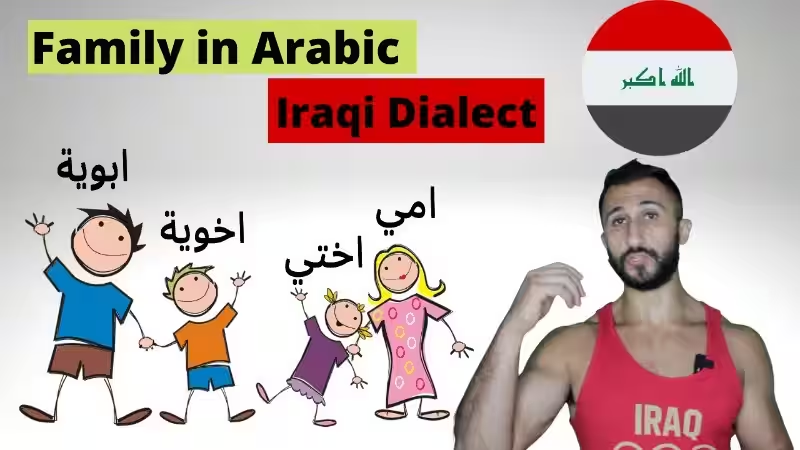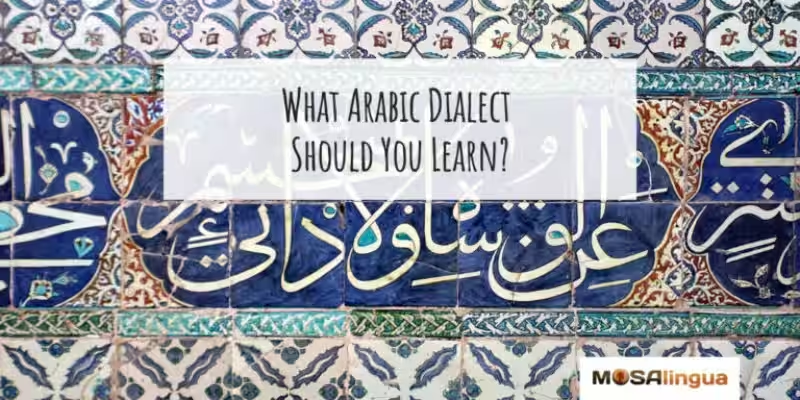
Learning Arabic, a language rich in history and culture, can be a daunting yet incredibly rewarding experience. But with a structured approach and a commitment to active learning, you can achieve conversational fluency. This guide will equip you with practical strategies to learn Arabic effectively, emphasizing both natural language acquisition and focused learning methods.
Choosing Your Path: Dialect vs. Standard Arabic
The first crucial decision you’ll make is choosing whether to focus on Modern Standard Arabic (MSA) or a specific spoken dialect. MSA is the formal, written form of Arabic used across the Arab world. It is the language of literature, news, and formal communication. However, understanding MSA alone won’t allow you to participate in everyday conversations. Spoken Arabic varies significantly between regions, and learning a dialect like Egyptian, Levantine, or Iraqi Arabic is essential for natural communication. Beginners often focus on a single dialect to avoid the overwhelming nature of multiple variations. Choosing a dialect will allow you to immerse yourself in a particular culture and community.
Learning a specific dialect, like Egyptian Colloquial Arabic, allows you to engage with the culture in a more authentic way. This nuanced approach to learning Arabic naturally provides a more complete understanding of the language and its cultural significance. Focus initially on one spoken variant before venturing into others. This focused approach will allow for more substantial progress in the early stages, enabling you to establish a stronger foundation for further language development.
Mastering the Arabic Alphabet and Vocabulary
The Arabic alphabet, unlike the Latin alphabet, is a script written right-to-left. Mastering the Arabic script is fundamental to reading and writing Arabic. Don’t hesitate to practice writing the letters, even if it seems slow initially. Learning the alphabet is not just about recognition; it’s about internalizing the shapes and sounds. Avoid transliterations, as they do not represent the true sounds or writing system.
Arabic vocabulary is constructed differently from many Western languages. Rather than relying on alphabetical order, Arabic often uses a root-based system where three-letter roots form the basis for numerous words with varying meanings and conjugations. Learning common roots and their associated words will greatly improve your ability to understand and build new vocabulary. Taking the time to learn the root system will significantly enhance your comprehension and accelerate your vocabulary acquisition. By understanding how words are constructed, you’ll be able to derive meaning from unfamiliar terms. This root-based system is a key element in learning Arabic effectively.
Immersion: The Key to Natural Language Acquisition
Learning Arabic effectively relies heavily on immersion. Surround yourself with native speakers, listen to Arabic music, and watch movies and television shows with subtitles. This helps familiarize you with pronunciation, vocabulary, and sentence structures. The more you’re exposed to spoken Arabic, the better you’ll be at understanding and reproducing it. This naturally includes actively seeking out opportunities to engage with the language.
Participating in an online community dedicated to learning Arabic, such as “Dive into anything,” is a valuable resource. Engaging with other learners and native speakers provides opportunities for feedback, practice, and expanding your understanding of the language. This method of acquiring the language involves not only studying the language but also connecting with people who share a similar passion for learning. By naturally interacting with the language, you gain a deeper understanding of its nuances and subtleties.
Finding the Right Resources and Tutors
Using high-quality resources is essential for effective learning. Look for reputable textbooks, online courses, and language learning apps tailored for Arabic. A well-structured learning plan can help you manage your time effectively, focusing on consistent progress. Finding a qualified tutor or language partner is also crucial. Look for teachers who employ active learning methods and encourage conversation. Choose a teacher who prioritizes practical application over theoretical explanations. Tutors who actively facilitate conversation are best suited for helping you develop your skills. Choose teachers who understand how to deliver lessons effectively.
Online platforms like Italki and language exchange programs provide access to native Arabic speakers. These platforms help learners connect with native speakers, facilitating conversational practice and feedback. By finding these resources, you can create a comprehensive learning experience for yourself.
Persistence and Patience: The Long Game of Language Learning
Learning any language, including Arabic, is a long-term commitment. Don’t get discouraged by slow progress. Embrace mistakes as learning opportunities and celebrate every small victory. Consistency is key. Dedicate a specific amount of time each day to practicing Arabic, whether it’s studying grammar, listening to audio, or engaging in conversations. Setting realistic goals and maintaining consistent effort are essential for success on this long and challenging path.
Remember that language learning is a marathon, not a sprint. Be patient with yourself, celebrate small victories, and focus on consistent progress. By developing these habits, you can gradually enhance your skills and build a strong foundation in the language. Developing a robust study routine is essential to stay focused and avoid burnout. Celebrate successes, no matter how small they may seem.
Beyond the Classroom: Embracing Arab Culture
Learning the language is intrinsically connected to understanding the culture. Seek out opportunities to learn about Arab culture, customs, and traditions. This will provide valuable context for your language learning and enrich your understanding of the nuances of Arabic communication. By immersing yourself in the culture, you develop a deeper understanding of the language’s subtleties and become more effective in communicating with native speakers. This cultural learning will help you communicate more effectively and naturally.
Embracing the culture is an essential part of learning the language, providing a profound deeper understanding of cultural norms and communication styles. This immersion into the culture will help you to better appreciate the significance of the language and its role within the society.
By following these practical strategies and embracing the commitment to the process, you can learn Arabic effectively and naturally. This will equip you with the tools necessary to communicate confidently and connect with the rich cultural heritage of the Arab world. Ultimately, learning Arabic is not just about acquiring a language; it’s about engaging with a vibrant community and culture.
Frequently Asked Questions (FAQ) – Learning Arabic Effectively
This FAQ section addresses common questions about learning Arabic effectively, drawing on insights from the “Dive into anything” community and best practices outlined in various resources.
How do I choose the right Arabic dialect to learn?
The “Dive into anything” forum emphasizes the importance of focusing on either Modern Standard Arabic (MSA) or a specific colloquial dialect (e.g., Egyptian, Levantine). Starting with one dialect is crucial for effective learning. Consider your goals: MSA is useful for reading and writing, while a colloquial dialect facilitates spoken communication in a particular region. Begin with one and gradually expand your knowledge to other dialects if desired.
Is Modern Standard Arabic (MSA) necessary to learn?
While not crucial for initial spoken fluency, MSA is essential for reading and writing Arabic. It’s often the foundation for understanding formal Arabic texts and is vital for engaging with a broader range of written materials. Learning it alongside a colloquial dialect provides a comprehensive understanding of the language.
What are the best resources for learning Arabic?
The “Dive into anything” community, alongside other resources like TalkInArabic.com, Rocket Arabic courses (potentially Egyptian), and Italki, offer various tools and support. These can include grammar explanations, vocabulary lists, audio/video materials, and opportunities for interaction with native speakers. Finding reputable materials and teachers is essential. Look for resources aligned with your chosen dialect and learning style.
How can I practice speaking Arabic effectively?
Active participation in online communities like “Dive into anything” or using language exchange platforms is beneficial. Seeking out native speakers or tutors offers crucial opportunities for feedback and practice. Start by practicing simple phrases and gradually work towards more complex conversations. Don’t be afraid to make mistakes; they are a natural part of the learning process.
How important is cultural immersion in learning Arabic?
Cultural immersion plays a vital role in understanding the nuances and subtleties of the language. Engage with Arab culture through media, literature, and interactions with native speakers. Learning about the cultural context enhances your understanding and appreciation of the language.
How long does it take to learn Arabic?
Learning Arabic, like any language, takes time and dedication. Achieving conversational fluency requires consistent effort, but the time frame varies based on individual learning styles, commitment, and the level of immersion achieved. Patience and persistence are key.
What are the key challenges in learning Arabic, and how can I overcome them?
Arabic presents challenges due to its unique alphabet, relatively low vocabulary overlap with English, and highly inflectional nature. Mastering the Arabic alphabet, using effective memorization techniques, and practicing regularly helps overcome these hurdles. Immersion in the language and culture is also vital.
How can I stay motivated and focused in learning Arabic?
Establish realistic goals, break down learning into manageable steps, and celebrate progress along the way. Seek out a supportive learning community (like the “Dive into anything” forum) to maintain motivation and stay focused on your goals. Remember that language learning is a journey, and setbacks are part of the process.
What should I do if I encounter difficulties with a particular aspect of Arabic?
Don’t hesitate to ask questions within the “Dive into anything” community, seek support from teachers or tutors, and utilize online resources to address specific challenges. Don’t isolate yourself; engaging with the learning community will be immensely helpful.








